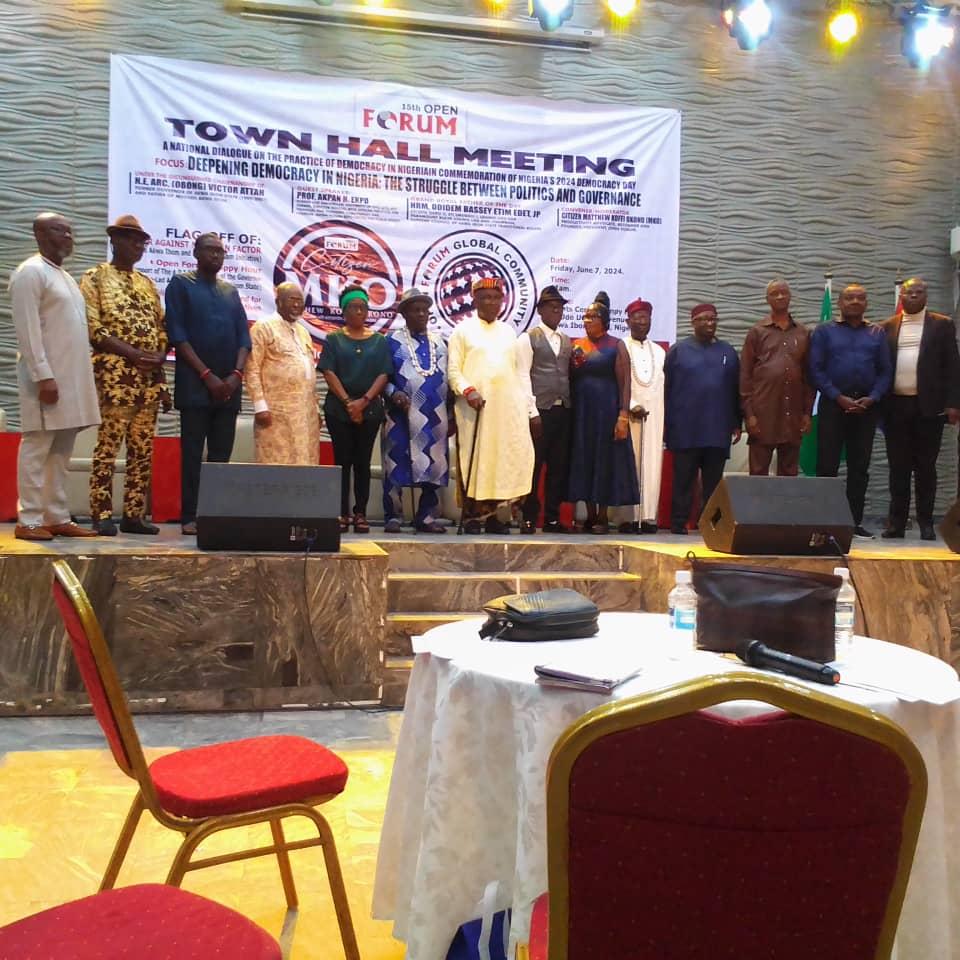Israel Umoh
After the sustenance of democracy in Nigeria for 24 years, Professor Akpan H. Ekpo, Nigeria’s scholar and famous economist, was full of uncertainty over Nigeria’s ability to deepen democracy.
Describing Nigeria’s democracy as dictatorship of the elites, he said the country practised Neo-Colonial/ Capitalist as economic system, civilian/democracy regime and Neo-Liberalism as its economic policy at independence in 1960 now still adopts Capitalist economic system, and Neo-liberalism as its economic policy under President Bola Tinubu.
Ekpo, the former Vice Chancellor of the University of Uyo, speaking at the 15th Open Forum Town Hall in Uyo, saw bleak future as long as Nigerian elected officers fail to differentiate politics from governance.
While dissecting a paper entitled: Deepening Democracy in Nigeria: The struggle between Politics and Governance, the former Director General of West African Financial Institute and Economic Management blasted the first shot thus ‘‘When the economy is generator-driven – electric power remains epileptic yet it is not a rocket science – stifling production.’’
The renowned economist further buttressed his stance ‘‘When 133 million citizens are multi-dimensionally poor, 85 percent of the citizens have no access to the basic necessities of life.’’
Ekpo who took to tatters the much-touted gospel of Nigerian politicians always claiming that they gun for elective positions to deepen democracy dusted the statement ‘‘When the rate of unemployment is above 38 percent and rising for youths.’’
Continuing, he reasoned ‘‘Only 10 percent of the citizens are benefiting from the vast resources of the country,’’ showing that 20 million benefit from the resources against the remaining 80 per cent wallowing in poverty.
‘‘When manufacturing contributes less than 10 percent to GDP since independence in 1960,’’ he intoned that the sector should have contributed at least 40 per cent to boost development of the country.
‘‘With allocative federalism rather than competitive federalism – there is need to restructure and give more economic powers to the federating units,’’ he argued that development is elusive as long as the federating units go cap in hand monthly to the centre to collect allocations instead of allowing them to generate their revenues.
Moreover, Ekpo doubted the country’s democracy making progress ‘‘When there is no middle class to cushion the excesses of the elites by building a palliative economy.’’
‘‘By implementing neo-liberal economic policies,’’ he asserted that Nigeria’s democracy may not deepen.
‘‘The struggle between politics and governance has over the years brought untold hardship to the vast majority of our citizens.
‘‘There is no doubt that the economy has not experienced good governance for the most part since independence. The ruling class seems not to know when politics ends and good governance starts,’’ he heaved.
However, Ekpo noted that good governance eludes the country for not producing better macro-economic and sectoral outcomes, not resulting in satisfactory sectoral economic performance: agriculture, manufacturing and services and lacking in transparency, accountability and comprehensiveness in the conduct of government business.
He further lamented that good governance which respects the rule of law, reduces corruption to the barest minimum, guarantees fundamental human rights and ensures economic rights of food, housing, education, quality health, clothing and security are lacking in the country.

